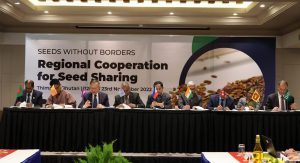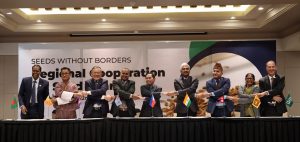Vietnam, Philippines and Fiji joined the Seed Without Borders agreement that was organized in Thimphu Bhutan from 22-23 November 2022. With the addition of new signatory countries, the following countries (Bangladesh, Bhutan, Cambodia, Fiji, Philippines, India, Nepal, Sri Lanka, Vietnam) and International Rice Research Institute (IRRI) are now part of the SWB initiatives. By joining the Thimphu Agreement, a signatory country becomes part of all previous agreements.
The Seed without Border is a regional seed policy agreement that was initially targeted to speed up the distribution of improved rice varieties. The Dhaka (2013) and Kathmandu (2014) agreements was limited to rice. However, the Siem Reap Agreement (2017) covered several crops – cereals, pulses, oilseeds, vegetables sugarcane and fibre crops. The seed sharing agreement offers a unique opportunity to exchange high yielding varieties beyond the borders with similar agro-ecological conditions to promote enhanced and least cost access to new improved varieties of crops to smallholder farmers. The agreement is a rare opportunity for like-minded countries to share commercial crop varieties to enhance crop production and food and nutrition security.
Just after signing of the Kathmandu agreement, India directly notified 4 rice varieties (Binadhan 8, 10, 11 and 12) from Bangladesh and two (Sukha dhan 5 and Sukha dhan 6) from Nepal in 2014 for cultivation in India. This saved about 4 to 5 years of time. Binadhan 11 and Binadhan 12 are big success in India. Later, in 2018, India notified three more rice varieties from Bangladesh (Binadhan 17, BRRI dhan 69 and BRRI dhan 75) for use by farmers in India.
Bhutan also contributed about 1000 kgs of seed of Yusi Maap which India directly notified and hence was able to save 8-10 years of time. This variety is performing well in India and is increasingly adopted by farmers.
The regional workshop was organized by the Ministry of Agriculture and Forests with financial and technical support from the IRRI, Australian Centre for International Agricultural Research (ACIAR), Asian Development Bank Institute (ADBI), Bill and Melinda Gates Foundation (BMGF) and the World Bank.


535 total views, 1 views today



